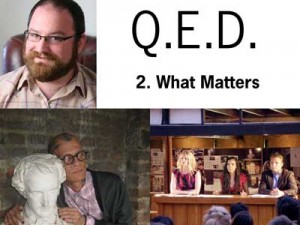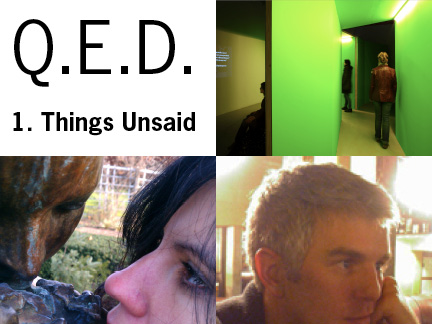Taking its title from a novel by Gertrude Stein, Q.E.D. (Quod Erat Demonstrandum, or Things as They Are) was a short series of long conversations curated by Les Figues Press co-directors Teresa Carmody and Vanessa Place.
Each conversation engaged three individuals—a writer, an artist, and a critic—with questions about contemporary issues and conditions of queer art and literature. Moderated by Vanessa Place, the topics and questions posed drew from the participants’ work, contexts, and philosophies to achieve not conclusion but insight.
Q.E.D. was held at the MAK Center for Art & Architecture at the Schindler House and supported through a Cultural Resource Development Grant from the City of West Hollywood. The June event was also part of the City of West Hollywood’s One City, One Pride Festival. Video of Q.E.D. is available at PennSound.
Part 1 | Things Unsaid | 11 April 2012
How do we articulate without articulating?
What are the negative spaces that form and inform your work?
Participants: Melissa Buzzeo, Patrick Greaney, and Simon Leung.
Review: “Selection from Q.E.D. Part 1,” guest review/post by Chris Hershey-Van Horn, on HTMLGIANT.
 Part 2 | What Matters | 9 May 2012
Part 2 | What Matters | 9 May 2012
How does materiality matter to you?
How is what matters made material?
Participants: Michael du Plessis, Brian Teare, Lincoln Tobier.
Review: “QED Part 2 – What Matters, What’s Matter,” guest review/post by Samual Soloman on HTMLGIANT.
Part 3 | Authentic Objects | 13 June 2012
Does an object need a form?
Does an objection?
Does anything speak for itself?
Participants: Judie Bamber, Dodie Bellamy, Terry Castle.
Review: “QED Part 3 – An evening of Authentic Objects,” guest review/post by Andrea Lambert on HTMLGIANT.
About Q.E.D. Participants:
Melissa Buzzeo is the author of three full length books: What Began Us (Leon Works 2007), Face (Bookthug 2009) and the forthcoming For Want and Sound (Les Figues 2012). Her current work Chasm explores negation, the legacy of performance art and the concept of the social body. She has taught at Brown, Iowa, Pratt, and Naropa, and currently lives in Brooklyn.
Patrick Greaney Patrick Greaney is the author of Untimely Beggar: Poverty and Power from Baudelaire to Benjamin (University of Minnesota Press, 2008) and articles on modern and contemporary art and literature. His co-translation of Heimrad Bäcker’s transcript was published by Dalkey Archive Press in 2010, and his translation of Urs Allemann’s The Old Man and the Bench: A Five-Month Twaddle will be published by Dalkey in 2013. He is Associate Professor of German Studies and Comparative Literature at the University of Colorado at Boulder, where he also directs the Graduate Program in Critical Theory.
Simon Leung is an artist who works across disciplines and mediums. His projects include an opera set in Los Angeles’s Griffith Park; a live/video performance addressing the psychological, philosophical, and political dimensions of AIDS in the figure of the glory hole; a trilogy on “the residual space of the Vietnam War;” and an extended project reposing Duchamp’s oeuvre as a discourse in ethics. His work has been presented internationally, including at the Guangzhou Triennial (2008); the Venice Biennale (2003); the Whitney Biennial (1993); the Museum of Modern Art; the Museum of Contemporary Art; the Generali Foundation (Vienna); and 1A Space (Hong Kong). Leung’s recent exhibitions include “POE” at Las Cienegas Projects and “91 92 93” at the MAK Center in Los Angeles; “Regress Progress” at the Ujazdowski Castle in Warsaw; and “War After War” at the CUE Art Foundation in New York. He has received fellowships from the Guggenheim Foundation, the New York State Council on the Arts, the New York Foundation for the Arts, and the City of Los Angeles, as well as the Art Journal Award for his essay “The Look of Law.” He is Professor of Studio Art at the University of California, Irvine.
Michael du Plessis teaches Comparative Literature and English at the University of Southern California, where he is also completing a masters degree in Professional Writing. His novel, The Memoirs of JonBenet by Kathy Acker, is forthcoming from Les Figues Press. He has written about a wide variety of subjects, from Goth culture to the French fin-de-siècle and has also performed, amongst other venues, at Highways and at the Schindler House.
A former National Endowment for the Arts fellow, Brian Teare is the recipient of poetry fellowships from the MacDowell Colony, the American Antiquarian Society, and the Headlands Center for the Arts. He is the author of The Room Where I Was Born, Sight Map, the Lambda-award winning Pleasure, and Companion Grasses, forthcoming from Omnidawn in 2013. An Assistant Professor at Temple University, he lives in Philadelphia, where he makes books by hand for his micropress, Albion Books.
Lincoln Tobier’s projects embrace a variety of media including sculpture, photography, painting, video, radio, and theater. Much of his work explores the limitations of the public sphere and communication. His recent play The Orchestra Pit Theory By Roger Ailes has been presented in Los Angeles and Leipzig and will be staged in London this summer. He has had solo exhibitions at Martos Gallery in New York, Daniel Hug Gallery in Los Angeles, the Pat Hearn Gallery in New York, Galerie Maisonneuve in Paris, and the Los Angeles County Museum of Art, among others, and has been included in group exhibitions at such institutions as MoCA, Los Angeles; the Museum of Contemporary Art, Leipzig; the Venice Biennale; the MAK Center Los Angeles.
Judie Bamber is an artist living and working in Los Angeles, CA. Her BFA was received from California Institute of the Arts in 1983. She is the recipient of the 2012 Richard Diebenkorn teaching fellowship, the 2008 California Community Foundation fellowship and the 2007 City of Los Angeles individual artist fellowship. She is currently a senior lecturer in Graduate Fine Arts at Otis College of Art and Design. Her work has been included in many national group exhibitions, most notable: Sexual Politics: Judy Chicago’s Dinner Party in Feminist Art History, UCLA Hammer Museum of Art, Los Angeles; In a Different Light, University Art Museum, University of California, Berkeley, California; Paper Trails: The Eidetic Image, Krannert Art Museum, University of Illinois at Urbana-Champaign, Illinois; and L.A. Hot and Cool, MIT List Visual Arts Center, Cambridge, Massachusetts. She is represented by Angles Gallery in Los Angeles, CA and she most recently exhibited there in 2011.
Dodie Bellamy’s most recent book is the buddhist (Publication Studio). Time Out New York named her chapbook Barf Manifesto (Ugly Duckling), a “Best Book Under 30 Pages” for 2009. Other books include Academonia, Pink Steam and The Letters of Mina Harker. Her book Cunt-Ups won the 2002 Firecracker Alternative Book Award for poetry.
The writer and critic Terry Castle – described by the late Susan Sontag as “the most expressive, most enlightening literary critic at large today” – has taught at Stanford University since 1983. Her scholarly interests include eighteenth-century British fiction, the Gothic novel, Jane Austen, the First World War, English art and culture of the 1920s and 1930s, autobiography and biography, and gay and lesbian writing. She has published eight books on diverse subjects, including Masquerade and Civilization (1986), The Apparitional Lesbian (1993), and the prize-winning collection, The Literature of Lesbianism: A Historical Anthology from Ariosto to Stonewall (2003). She is also a well-known essayist and has written frequently for the London Review of Books, Atlantic, New Republic, Times Literary Supplement, New York Times Book Review, and other periodicals. Her latest book, The Professor and Other Writings was published by HarperCollins in January 2010. In 1997 she was named Walter A. Haas Professor in the Humanities at Stanford. In her spare time, she is a visual artist, music and book collector, and miniature dachshund enthusiast. She lives in San Francisco.
Of Vanessa Place and Robert Fitterman’s Notes on Conceptualisms, Mary Kelly said, “I learned more about the impact of conceptualism on artists and writers than I had from reading so-called canonical works on the subject.” Kenneth Goldsmith said Vanessa Place’s work was “arguably the most challenging, complex and controversial literature being written today.” Rae Armantrout said, “Vanessa Place is writing terminal poetry.” Bebrowed’s Blog said Vanessa Place is “the scariest poet on the planet.” Anonymous on Twitter said, “Vanessa Place killed poetry.”


Comments are closed.